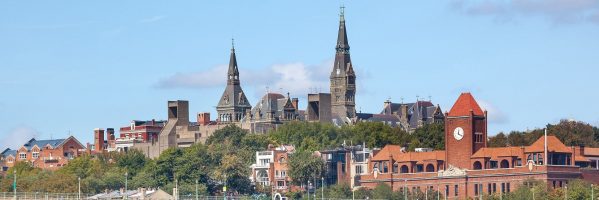Turning Ocean Garbage Into Helpful Prosthetics, and More – Chicago News

Let’s explore some of the most interesting stories that have emerged from Chicago business schools this week.
How “Speed Factories” Help Companies Adapt to Capricious Consumers – Kellogg Insight
In a new study co-authored by Northwestern Kellogg Professor of Managerial Economics and Operations Jan Van Mieghem, Vlerick Business School’s Robert Boute, and Cardiff Business School’s Stephen Disney, the trio survey the return on investment for “speed factories” or local-market facilities “designed to quickly pump out products with shorter life cycles and less predictable demand.”
In the e-commerce age, speed factories are in high demand for manufacturers of realms of sneakers and sports apparel where they “offer fast turnaround to meet demand [for] custom-made products for very small local markets.”
Van Mieghem writes, “Amazon and fast-fashion trends mean that companies have had to increase their speed from product design to delivering that product to customers. If things must happen in days or weeks rather than months, you can’t be doing that from somewhere in Asia.”
The catch is that production costs are often extremely high. However, the trio found that speed factories are “worthwhile, despite their cost, and are best used as part of a portfolio of on and offshore production.”
Van Mieghem adds, “It’s about maintaining the flexibility to bring certain products in and move others out of a speed factory as needed.”
You can read more about the trio’s research here.
Anacortes Couple Turns Ocean Plastics into Prosthetics – K5 News
Gies College of Business Online MBA (iMBA) student and Anacortes, Washington resident Chris Moriarty and his wife Laura co-created the nonprofit Million Waves Project, which “takes littered plastics from the beaches for use in the creation of prosthetics.”
According to a recent profile on Seattle’s K5 News, “It takes just 15 plastic bottles, $45, and two-and-a-half days to make one hand. The couple uses open source software, a company that processes the plastic into filament and a 3-D printer.
In the K5 profile, Chris said, “We thought, wouldn’t it make a lot of sense to take something deplorable in one sense and something heartbreaking in another, put them together and see what we could do.”
Laura adds, “It is daunting. Life is daunting. But like we tell our kids, that doesn’t mean you don’t move forward and try.”
Taking Stock of Market Uncertainty – Quinlan School of Business Stories
The Loyola University Quinlan School of Business blog recently profiled Assistant professor Hae mi Choi, Ph.D. about her research on how macroeconomics and market uncertainty influence financial analysts’ incentives over time.
Professor Choi explained that “financial analysts’ incentives and their forecasting performances are affected by market uncertainty, [which is] when investors have difficulty assessing the current and future market conditions because there is a lot of volatility within the market.”
Choi explains the value of her research to Quinlan students:
“If you want to be a good investor, you need to not only understand what’s going on within a firm, but also the macroeconomic conditions and the stock market conditions in general. Understanding how other investors in the stock market process information and how financial markets function is fundamental, as it impacts the wealth of us all.”
You can read the full interview here.
July MBA Application Deadlines Are Coming Up

Yes, it’s finally summertime and the livin’ is easy, but that doesn’t mean you can sleep on these upcoming MBA application deadlines. Take a look at which programs have deadlines coming up, and get these applications in now so you can hurry back to the beach and work on that tan! Continue reading…
School v. School: Berkeley Haas or UW Foster?

With all the options for incredible business schools throughout the country, it can be a tall order to narrow down programs and choose the right degree for you. In our School v. School series, you can compare and contrast some of the best programs around the United States, helping to cut through the noise and find the best MBA for you on the West Coast.
The Value of Choosing a Research-Focused MBA Program at UW Foster

How important is faculty research to choosing your MBA program? Should you care if you go to a research university or is it all just white smoke? Is there value in choosing a research-focused MBA program?
We know that faculty matter. According to a paper written by researchers at Indiana University and Michigan State University titled “Faculty Do Matter: The Role of College Faculty in Student Learning and Engagement,” faculty have a significant impact on student learning and the overall educational experience.
“The impact that a faculty member can have on the student experience can be seen in and out of the classroom,” the study explained. “We found that faculty behaviors and attitudes affect students profoundly, which suggests that faculty members may play the single-most important role in student learning.”
But what about faculty research, is it important? Continue reading…
The QS World MBA Tour Is Coming To Washington DC

The QS World MBA Tour will be stopping in Washington DC on Tuesday, January 23, 2018.
Potential graduate school applicants attending these events will have an opportunity to connect with alumni from many of the most prestigious schools in the world, including the likes of The Wharton School at the University of Pennsylvania, Harvard Business School, the Stanford Graduates School of Business, and much more.
Details on the event website read as follows:
“The QS World MBA Tour gives you the opportunity to network with admissions directors and alumni from over 120 business schools around the globe. Our fairs feature top local and international business schools presenting a diverse range of programs to choose from and a chance to apply for a pool of exclusive MBA scholarships, totaling $7m [million]! The QS World MBA Tour takes place in 23 cities across the US and Canada; find an event in a city near you and discover the many benefits that an MBA has to offer.”
Registration and further details for the Washington DC event can be found here. For those not in the metro, check out the rest of the QS World MBA Tour dates, listed below.
- Boston: Thursday, January 18, 2018 – 4:30 – 9 p.m.
- New York: Saturday, January 20, 2018 – 1:30 – 6 p.m.
- Washington DC: Tuesday, January 23, 2018 – 4:30 – 8:30 p.m.
- Chicago: Thursday, January 25, 2018 – 4:30 – 8:30 p.m.
- Los Angeles: Saturday, January 27, 2018 – 1:30 – 6 p.m.
- San Francisco: Sunday, January 28, 2018 – 1:30 – 6 p.m.
- Vancouver: Tuesday, January 30, 2018 – 4:30 – 9 p.m.
- Montreal: Thursday, February 1, 2018 – 4:30 – 9 p.m.
- Toronto: Saturday, February 3, 2018 – 1:30 – 6 p.m.
Registration and more information on the QS World MBA Tour events can be found here.
For a Career in Supply Chain Management, Head to Washington DC

Today’s boardroom is tomorrow’s chopping block. Business is a beast, no doubt, one whose needs grow increasingly demanding and complex along with those of we, the consumers, who drive it.
To navigate let alone thrive in this hectic environment requires unprecedented strategy, analysis, and execution. For many companies navigating the unruly seas, so to speak, the great white hope is an unsung hero of sorts: the supply chain manager.
Supply chain managers, or SCMS, have long been vital to the quality and productivity of projects. In short: SCMs oversee how all the constituent parts of their product—raw materials, information, and finance—move from supplier to manufacturer to wholesaler to retailer to consumer.
There are certainly lots of moving parts to this position—no pun intended—which makes sense why supply chain management has become such a popular concentration at business schools and an increasingly in-demand gig for graduates.
When it comes to ideal places to pursue an SCM degree, it doesn’t get any better than Washington DC, a cosmopolitan, cross-sectional hub for politics, business, and tech. In addition to its strategic mid-Atlantic location, sandwiched between the business centers of the lower Midwest, the upper Southeast, and the lower Northeast, the Chocolate City is home to a wide range of industry players, offering infinite access to whichever field you aspire to enter through an SCM degree. In addition to the warm, friendly folks like Lockheed Martin and Capital One that make their home in the Beltway, startups like HireKeep, NotionTheory, and Click2Mail do as well.
For you aspiring supply chain managers out there, we did the legwork for you and took a deeper dive into four DC metro degrees.
University of Maryland’s R.H. Smith School of Business
The UMD Smith MS in Supply Chain Management is consistently ranked as one of the most innovative in the region. Whether you’re looking to become a buyer, a logistics officer, freight specialist, or key account specialist, Smith will give you the “relevant, real-world experience” needed to “drive business growth, promote efficiency, sustain the planet,” and last but not least—impress recruiters. Smith’s deep ties to Wal-Mart, Bosch Rexroth, AstraZeneca, China Mobile Cooperation, and Unilever will surely benefit Smith MBAs. All graduates become Lean Six Sigma Yellow Belt™ (ICYB™) Certified by the International Association for Six Sigma Certification (IASCC).
Howard University School of Business
The Howard University School of Business‘ Supply Chain Management (SCM) concentration was designed specifically to prepare students for “leadership roles in global corporations and government entities.” Howard’s combination of faculty, curriculum, executive sponsorship, and real world experience means that graduates are well-equipped to meet the demands of an increasingly competitive job market.
CHECK THIS OUT: What Are The Differences Between The World’s Best Online MBA Programs?
Georgetown’s McDonough School of Business
Operations and Information Management (OPIM) concentration at Georgetown University’s McDonough School of Business is an interdisciplinary effort that combines Production and Operations Management, Operations Research/Management Science, Statistics/Decision Analysis, and IT/Systems Management. OPIM was designed to create opportunities for research and employment within information systems that support decision processes, risk management, business analytics, and global operations.
George Mason University School of Business
The George Mason University School of Business offers a Project Management concentration that might appeal to MBA candidates with an interest in supply chain. The Project Management concentration—available both online and on-campus—was designed to give MBA candidates the “knowledge and skills needed to manage major projects from conception to implementation.”
